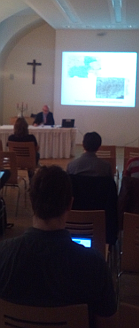|
|
|
|
|
|
|
|

|
Digitising Patterns of Power
Newsletter No.4 / December 2017
|
Dear Ladies and Gentlemen,
Dear Colleagues,
Our digital project DPP is approaching its fourth and final year with huge steps. We are very grateful
for the results, which have been achieved by us in a joint, hard work so far. This time our newsletter
emphasises our outreach to the public. We will participate at the International Medieval Congress (IMC)
in Leeds in 2018. Moreover, we are preparing an edited volume of our project, which will be entitled
"Power in Landscape – Geographic and Digital Approaches on Historical Research" and will outline our
methodological as well as technical approaches in a clear and transparent way. The personal interaction
of the PI with the Long-Term-Project "Tabula Imperii Byzantini (TIB)" at the Austrian Academy of Sciences
becomes manifest in two additional monographs on Historical Geography. Finally, our software tools will
be used and also tested by another digital project, namely "A Digital Geoportal of the History of the
Serbs in Vienna (1741-1918)", which will start in January 2018 at the Austrian Academy of Sciences.
May your Christmas be merry and bright and your New Year 2018 happy and fruitful!
Yours sincerely,
the DPP team
|
|
|
|
|
|
|
|
Manifold Papers on DPP
|

|
The autumn of 2017 saw several papers on quite different scholarly topics of our project.
On 28 September 2017 Dr. Yuri A. Marano, visiting scholar of DPP in Vienna, presented a paper on
"Signs of Power in Carolingian North-Eastern Italy (8th-9th Cent.): an Archaeological Approach" within
our DPP Lecture Series.
He outlined that the consolidation of Carolingian power over north-eastern Italy determined a
reorganization and redistribution of power, and that the region was more securely tied to the Empire by
reworking its political and ecclesiastical institutions. Moreover, Dr. Marano presented fascinating new
archaeological evidence on the region and its rich Cultural Heritage.
|
|
|
|
|
|
|
|
Digital Geoportal of
the Orthodox Peoples in Vienna
|

|
A new, confined digital project will begin in January 2018, which is headed by Mihailo Popović as Project Leader and funded by the Magistratsabteilung 7 (MA 7) – Kulturabteilung der Stadt Wien for the duration of 12 months. It is entitled "Ein digitales Geoportal der Geschichte der SerbInnen in Wien (1741-1918)" ["A Digital Geoportal of the History of the Serbs in Vienna (1741-1918)"] and is based at the Institute for Medieval Research (Division of Byzantine Research) of the Austrian Academy of Sciences in Vienna.
|

|
|
|
This research project focuses on the history and presence of Orthodox Christians, and in particular of the Orthodox Serbs, in Vienna, thus pointing to one specific part of Byzantine Heritage in Central Europe. It uses biographical data on the Orthodox Serbs in Vienna in the period from 1741 until 1918 in order to illustrate how the Orthodox began to migrate to the Habsburg Empire, how Orthodox merchants settled in Vienna and how they integrated into Viennese society of that time. On the basis of meticulously researched data in Austrian archives the life of famous Serbs in Vienna is reconstructed. Their places of dwelling and action are localised and embedded into a customised OpenAtlas database with an online Geoportal, which will be developed during the project and will be open to the interested public after the completion of the project. This research project will use software tools, which have been developed by DPP since 2015, and test them in a new environment with different data sets. Thus, it will contribute to the development of the OpenAtlas database, to tools fostering the outreach to the general public as well as to Digital Humanities in History, Balkan Studies and Byzantine Studies.
Cf. for further information: http://dpp.oeaw.ac.at/orthodoxe-in-wien/
|
|
|
|
|
|
|
|
DPP at the IMC Leeds 2018
|

|
News have reached us recently that three out of three of our sessions have been accepted at the International Medieval Congress (IMC) 2018 in Leeds. The first session (640) is funded by the FWF Austrian Science Fund Project P 30384-G28 "Byzantino-Serbian Border Zones in Transition: Migration and Elite Change in Pre-Ottoman Macedonia (c. 1282–1355)" and is entitled "Imperial Memory Then and Now, I: Personal Agency in
Byzantine Macedonia". The second (740) is sponsored by the project DPP and bears the title "Imperial Memory Then and Now, II: The Aftermath of Imperial Landscapes". The sponsor of the third and last session is the University of Vienna (Department of Geography and Regional Research), which is entitled "Imperial Memory Then and Now, III: Empire, Geography, and Digital Humanities". All three will take place subsequently on Tuesday, 3 July 2018, from 11.15 until 18.00.
As soon as the timetables and the venues of our sessions at the IMC 2018 have been fixed, we will inform you in more detail in our forthcoming DPP Newsletters.
|
|
|
|
|
|
|
|

|
Published and Forthcoming
Books
|
As mentioned in the foreword of this newsletter, our DPP team is preparing an edited volume of our
project, which will be entitled "Power in Landscape – Geographic and Digital Approaches on Historical
Research". It will consist of three distinct parts – articles of the DPP Case Studies, on the technical
achievements of DPP and finally on related digital projects in an international perspective. The volume
will summarise our scholarly results as well as present the functionalities of our software and introduce
both to the scholarly community and the interested public.
Moreover, Mihailo Popović has published recently a monograph on Historical Geography with the publishing
house Akademska Knjiga in Novi Sad, which is
the Serbian translation of his book
"Von Budapest nach Istanbul. Die Via Traiana im Spiegel der Reiseliteratur des 14. bis 16. Jahrhunderts"
|
|
|

|
A highlight within new studies in Historical Geography of the Mediterranean World will be a special
volume of the series
"Studies in Historical Geography and Cultural Heritage" in honor of Professor Dr. Johannes Koder,
which unites renowned national as well as international scholars from the academic fields of History,
Byzantine Studies, Medieval Studies, Historical Geography and Archaeology. It will be entitled
"Space, Landscapes and Settlements in Byzantium" and is edited by Professor Dr. Andreas Külzer and
Mihailo Popović from the part of the Long-Term-Project "Tabula Imperii Byzantini (TIB)".
Johannes Koder was Professor for Byzantine Studies at the University of Mainz in the years
1978-1985 and was holding the professorship at the Institute of Byzantine Studies of the University of
Vienna in the years 1985-2010. Johannes Koder, full member of the Austrian Academy of Sciences, has
shaped the project "Tabula Imperii Byzantini (TIB)" since 1966. This volume will be published at the end of 2017.
|
|
|
|
|
|
|
|
|
|